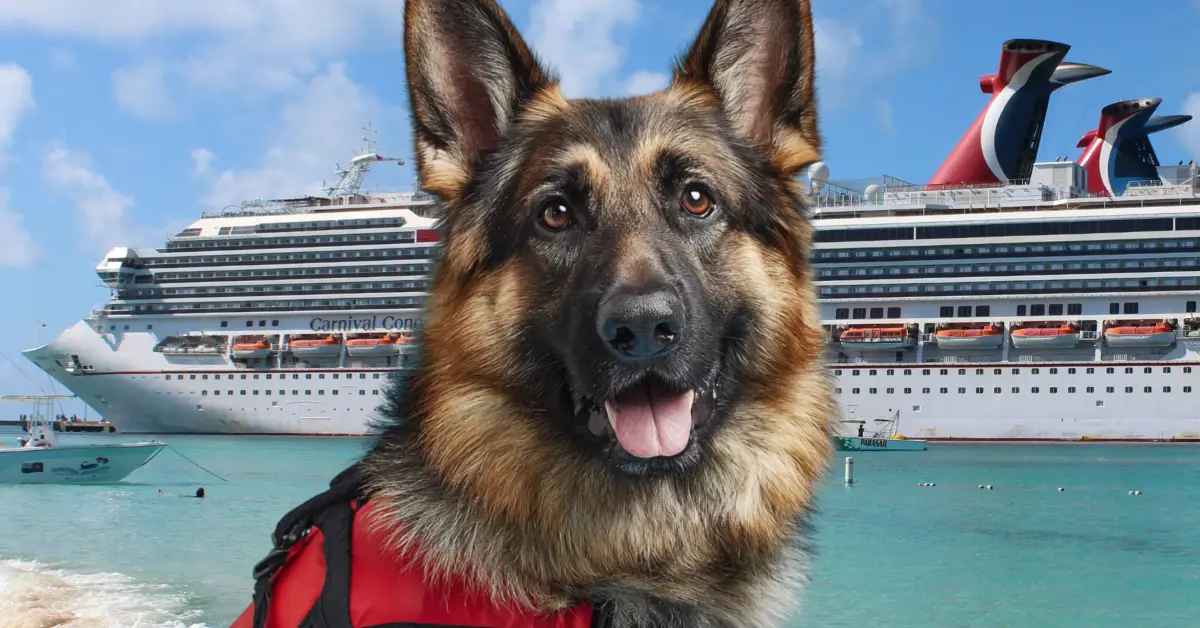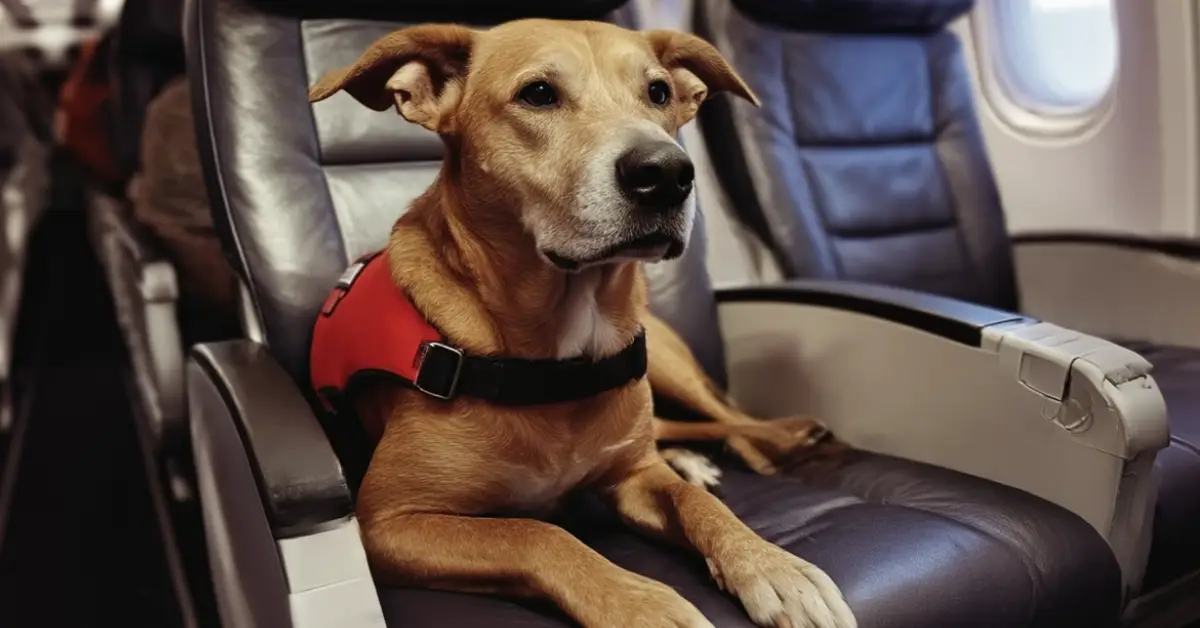How to Bring a Service Dog on Carnival Cruise

Yes, you can indeed bring your fully trained service dog aboard a Carnival Cruise. Here are 5 steps to take to bring your service dog on Carnival:
- Notify Carnival about your service dog by contacting their Guest Access Department at 1-800-438-6744 ext. 70025, or emailing access@carnival.com.
- Ensure your service dog is at least 6 months old and has an ISO-compatible microchip implanted before receiving a rabies vaccination.
- Prepare the necessary documents, including the CDC Dog Import Form, vaccination records, health certificate, and international health certificate.
- Check port requirements by visiting aphis.usda.gov for entry requirements, import licenses, and restrictions.
- Bring sufficient dog food, bowls, and medications for the entire cruise, as well as a leash and service dog vest or harness.
If you want your cruise to be carefree, you’ll need to do a great deal of planning. That’s not only because of the rules Carnival has in place, but also because every port of call (including those in the US) will have its own set of policies that may require additional paperwork and vaccinations.
Once you know which country you’re visiting, you’ll need to contact the United States Department of Agriculture, the applicable United States consulate, or the embassy of that country to determine the policies and obtain the necessary permits for each port of call. Carnival welcomes all service dogs onboard, including psychiatric service dogs, that meet ADA service dog requirements.
In this article:
- Health and documentation requirements
- Rules while onboard Carnival Cruise ships
- Pro tips for bringing your service dogs aboard Carnival Cruise ships
- A final note
Health and Documentation Requirements
As a service dog owner, you are responsible for obtaining import permits for service animals from all countries that require those special documents. According to Carnival, your service dog should meet these requirements:
- Be healthy upon arrival
- Be at least 6 months of age
- Have an International Organization for Standardization (ISO) compatible microchip implanted prior to any required rabies vaccinations
- Have a CDC Dog Import Form receipt (accessible on the CDC’s website)
- Submit copies of your vaccine records to access@carnival.com no later than one week prior to sailing.
- Hand-carry all required documents, along with your working service dog’s current vaccination records, which must show the service dog’s microchip number. Once on board, documentation will need to be submitted to Guest Services
It’s important to research each country you’re visiting, as they will have specific regulations and policies for importing animals. If you need help planning your trip, you can contact Carnival’s Guest Access team for more information.
Rules While Onboard Carnival Cruise Ships
Once aboard a Carnival ship, you will need to follow their rules and regulations. Specifically:
- Dogs may not be allowed on furniture or in pools or saunas, although they are welcome in all other public areas.
- Dogs may not be fed in ship’s dining rooms or brought into food preparation areas.
- Service dogs may not be left unattended in your stateroom. Ship’s staff are not allowed to look after your dog, even if they are willing.
- Service dogs must be on a leash in all public areas.
- Carnival expects your dog to be in “uniform” when in common areas of the ship. That means having something like a vest, harness, tag, or ID that clearly identifies your dog as a service animal.
Your dog can only relieve itself in the designated relief area, using the Second Nature Dog Litter provided by the ship. If you want to use another material, you must not only provide it yourself but also ask for approval for its use from the Guest Access department.
Service dogs are not permitted on furniture, or in food preparation areas, pools, whirlpools, saunas, or steam rooms. Service dogs are permitted in all other public areas of the ship, including dining areas, while on a leash.
Pro Tips for Bringing Your Service Dogs Aboard Carnival Cruise Ships
While service dogs (as opposed to pets or emotional support animals) are allowed aboard most cruise vessels, it isn’t always easy to make the experience positive. Before making a decision, it’s important to review what the process entails and what the experience will be like. Here are a few key points:
- Ships don’t carry any supplies for your dog, except for pellets for the relief area. That means you’ll have to pack along anything your dog needs, including all the food they’ll consume during your time away from home.
- The process of applying for documentation can be lengthy and complex. You will need to take your dog to the vet for a health check, have proper vaccinations, and carry all documentation with you. If you disembark at a port of call, you may need to undergo a lengthy approval process at the port.
- If you are traveling to more than one country, you will need to prepare documentation for every country you visit.
- Cruisers come on board for a luxurious getaway — and some may have issues with having to share their space with a dog. While this is true in any vacation setting, it’s hard to get away from disapproving stares aboard a cruise vessel.
Both cruise staff and visitors may have questions or concerns about your service dog, and it can be challenging to answer those questions repeatedly. That’s where it really helps to have service dog accessories, like vests, tags, and ID cards.
A Final Note
It takes work and attention to detail to bring a service dog aboard a Carnival cruise and enjoy shore excursions. Before making a decision, it’s a good idea to email their Guest Access Department to discuss the process and your particular needs. Be sure to start the process early, as it can take months to receive all the necessary documentation. Carefully consider which cruise you’d like to take, as some will be much easier to manage than others, depending on each nation’s animal import policies.
About the Author: Lisa Jo Rudy, M.Div. has been writing on developmental disabilities and mental health since the early 2000s, when her son was diagnosed with autism. Lisa lives on Cape Cod, where she is the proud "mom" of two beautiful cats.
Related Articles

How to Fly With Your Dog Step-by-Step
Taking your dog on an airplane is easy when you know the airline’s policies for both pets and service dogs, and you come prepared. When flying with a service dog, you will have more rights than flying with a dog that’s considered a pet, but the process is similar. This guide walks you through everything […]

Read More

How Do I Fly With My Dog To Hawaii?
It’s travel season and Hawaii is the perfect destination for the summer. Kids are out of school, the weather is warm, and the tropical paradise known as Hawaii is a tourist destination fit for everyone. Even dogs! This blog post will give you some guidelines and information on bringing your pet to the most traveled […]

Read More

Service Dog Rules for Staying in Hotels
Service dogs have hotel rights as part of the public access rights given to service dogs and their handlers under the Americans with Disabilities Act (ADA). This means they cannot be treated as pets and can accompany their handlers at no additional cost. Unfortunately, hotel staff members are sometimes unaware of these rights and don’t […]

Read More
